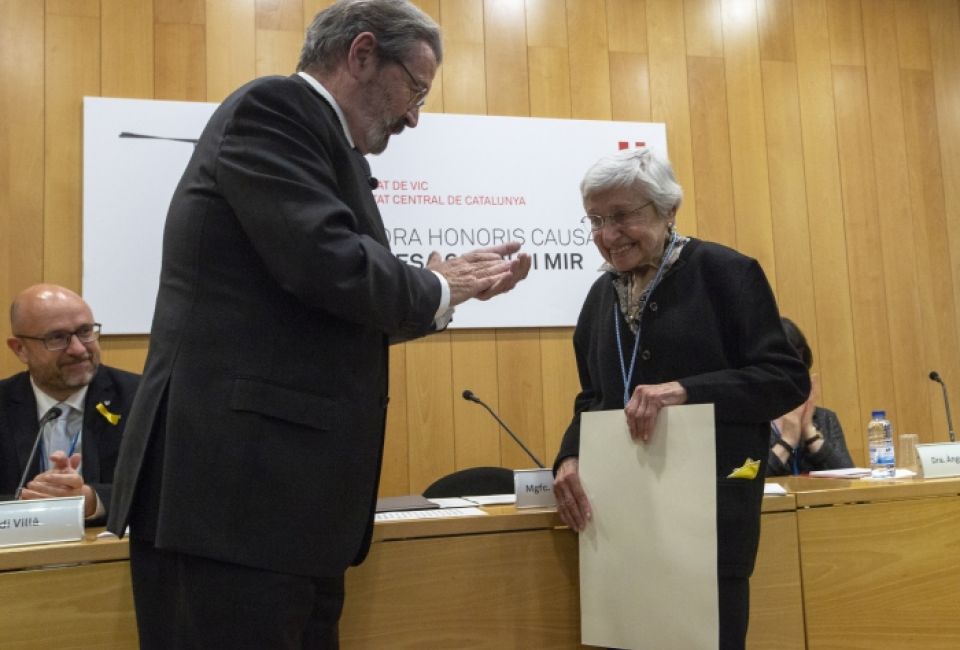
Maria Teresa Codina: "schools must educate in the present, while focusing on the future"
The University of Vic - Central University of Catalonia invested Maria Teresa Codina i Mir as a Doctor Honoraris Causa last Tuesday afternoon. With this honorary doctorate, the University wishes to pay tribute to one of the leading figures in Catalonia's educational renewal movement, who played a major role in education during the twentieth century. Dr Codina and the generation of teachers to which she belonged were inspired by the principles of active education in the early twentieth century, and exerted a major influence during Spain's transition to democracy and the early years of democracy after the Franco dictatorship.
In her acceptance speech, Maria Teresa Codina said that "being a teacher is character-building" and highlighted two constants in her professional career. First, interest in perceiving the here and now of the present: "I decide to look at the situation I find myself in, see what is necessary and based on that, find out what I am able to accept and reject." Second, "the awareness of the commitment that I make in each case, which requires dedication" and at the same time, "having enough freedom to act consistently with the starting point." She explained that she always worked to build "a school that educates in the present while focusing on the future," and that teamwork was therefore always crucial. The new doctor also said that she considers herself very fortunate to "have experienced a wide variety of educational situations very intensely" and to having "enjoyed working as a teacher across a broad spectrum of society."
Codina also thanked the UVic-UCC for the honour conferred on her, and described the University as a teaching institution that she has always respected "for its thoroughness in knowledge and at the same time, for its proximity to its students, for its attention and openness to what is new."
Fight for the right to education
The sponsor of the new Doctor Honoris Causa was Eduard Ramírez, dean of the Faculty of Education, Translation and Human Sciences (FETCH), which had proposed her investiture. Ramírez emphasised Codina's "constant, persistent and highly influential work for society in the field of education," as well as her "fight for the right to education and equal opportunities, with her perspective always focused on the most disadvantaged groups." He also defined the honoree as a person "of admirable simplicity, humility and courage" and a "wise woman," and said that thanks to her generation of teachers, "the path was easier for those who came afterwards."
The person responsible for delivering the Laudation was Dr Joan Soler, lecturer in the Department of Teaching in the FETCH, who outlined her life story, which has always been linked to education: first, as the founder of the Talitha school, which "changed the bleak educational landscape which Francoism created"; later, as a member of the founding team at the Rosa Sensat College of Teachers, where she "established a model of teachers committed to the improvement of education, the country and the renewal of schools"; and subsequently, as the person behind projects including the Casa Antúnez Secondary School, the Avillar Chavorrós school and the Xavó-Xaví adapted secondary school in the Can Tunis neighbourhood, where according to Soler, two important dimensions appeared: "the idea of the school-community" and "the right to education and the fight for equal opportunities"; and finally as the driving force behind special action programmes, compensatory education initiatives and diversity education projects in the Ministry of Education of the Government of Catalonia and Barcelona City Council.
The rector of the UVic-UCC, Jordi Montaña, who was chairing his final investiture of a doctorate honoris causa before leaving office, said he felt "deeply privileged that it has been to award this academic honour to such a good, strong person, who has been, is and will be a model for our Teaching students, as well as those on every other university degree." Montaña also expressed his conviction that Codina's recognition should act as "a reminder of the importance of training for teachers" in content and in "the intrinsic values of their role in society."
A diverse audience in a full Aula Magna
This was the first doctorate honoris causa that has been awarded to Maris Teresa Codina, who was born in Barcelona in 1927. The Aula Magna was filled with more than 300 people, from very varied groups and generations, who wished to accompany her during this tribute. They included ex-students and former colleagues at the Talitha school and in the can Tunis district, as well as Irene Rigau and Meritxell Ruiz, former ministers of Education of the Government of Catalonia.
As tradition dictates, at the beginning of the ceremony around seventy doctors of the UVic-UCC's Senate entered the room in a procession, wearing their University doctor's medals. During the ceremony, students on the Bachelor's degree courses in Teaching at UVic who have studied the role played by Codina spoke a few words in tribute to her, as did Clara Ponsati, ex-student of the Talitha school and ex-Minister of Education, via a video.
The Osona-based artist Montsita Rierola gave Codina the original of the commemorative initium of her doctorate honoris causa: two helical blades placed perpendicularly, an image with a minimalist features with utmost expressiveness that evokes open space, of the wind and the ability to take advantage of them in people's interests. The music during the ceremony was provided by the UVic's Choir of Students, while the university's Castellers Group, the Emboirats, raised a column in the new doctor's honour.